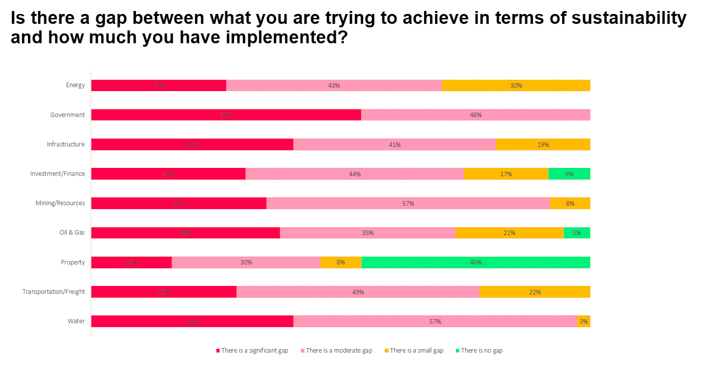Research published by professional services company GHD Advisory has found that over half of property executives surveyed for the company’s GHD Sustainability Monitor 2024 found that there is little or no gap between sustainability vision and execution.
Surveying 550 executives from around the globe, the report – GHD Sustainability Monitor 2024: From Ambition to Action – indicates that a minority 46 percent of property executives report a moderate or significant gap between sustainability vision and execution, compared to an average of 79 percent across all sectors. The report identified barriers to corporate sustainability, and what is required within certain sectors to achieve emissions targets and sustainability goals.
While the numbers are promising and the property industry is mostly delivering on its sustainability goals, the amount of carbon emissions created by the built environment means that continued, improved and sustained sustainability efforts are vital to reaching the desired emissions targets set by governments worldwide.

“While multiple sectors are waving red flags when it comes to implementing their sustainability strategies, the property industry’s advantage over other sectors is that it has long had the technical tools – including building codes and rating schemes - to measure its sustainability performance and link those to bottom line results,” says Richard Fechner, Executive General Manager, GHD Advisory.
“There’s a need for a new breed of sustainability professionals who can talk the language of business, especially for those with experience in being responsible for profit and loss reporting, and with a deep understanding of the technical aspects of sustainability.
“The challenges are complex, the way forward does not need to be.”
27 percent of property executives believe that education and training will assist in helping achieve sustainability goals in future, while 24 percent cited specialist sustainability skills as what is required to help achieve sustainability goals.
The report suggests five strategies to accelerate immediate sustainability efforts, initially emphasising the importance of realising sustainability goals amidst economic uncertainty, by testing strategies and assessing implementation costs against timelines. From there, it advocates leading with social engagement, involving both internal and external stakeholders in a comprehensive plan for progress.
The report then recommends prioritising corporate sustainability regulations to build trust and consensus on targets, utilising regulations for increased efficiency and collaboration, and then addressing Scope 3 emissions involves upskilling the supply chain through change management and behaviour-related programs. Lastly, the report encourages being a pioneer by leveraging early access to limited funding and talent to develop training programs for equipping individuals with sustainability skills.

